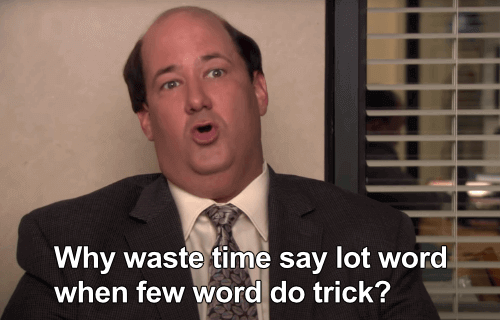Question above is pretty blunt but was doing a study for a college course and came across that stat. How is that possible? My high school sucked but I was well equipped even with that sub standard level of education for college. Obviously income is a thing but to think 1 out of 5 American adults is categorized as illiterate is…astounding. Now poor media literacy I get, but not this. Edit: this was from a department of education report from 2022. Just incase people are curious where that comes from. It does also specify as literate in English so maybe not as grim as I thought.
In my experience, there’s also a poverty component. Some families may have to move into a shelter in a different school district or even state. Within that you can stay at a shelter for a short and long time. Education is also not usually a focus of the family, or theres not enough time. So you have a situation where you are constantly moving places and schools, and your family doesn’t take any time to teach reading outside of school for whatever reason.
So I am a researcher by trade in this field, got a PhD, and develop these kinds of stats (at a more local level). I also have taught basic adult literacy for about 15 years. I think the poster was likely referring to an NCES stat.
We tend to think of adults with low English literacy as people who dropped out of school or never went. We also tend to think “illiterate” is binary, you can read or you can’t. But the definition is based around grade-level reading (what can you identify and synthesize from standardized text in English in a given time frame) and inclusive of a broader population. We’re talking about people who can’t pick up a copy of USA today and tell you the main idea of a front-page article. They can drive, they can work, etc. So they get along and this issue get ignored.
For example, some stats on illiteracy will count “non-participants” among those who can’t read/write, but this includes people in the study with cognitive disabilities or language barriers to the point that they can’t take the reading test. The share of U.S. adults who are functionally illiterate in English includes some non-native English speaking adults and also a couple generations of folks with reading diasbilities who passed through school, AND people who didn’t read for myriad other reasons.
I have tutored older adults learning to read/write for many years and have met a lot of people who ran businesses or raised families or worked full careers before learning to read. Adaptable and clever bunch. And even many U.S.-born native English speakers who got shuffled through high school despite serious disadvantage and/or disabilities.
people who can’t pick up a copy of USA today and tell you the main idea of a front-page article
Thanks! Suddenly America makes a lot of sense now.
Very interesting read! I’m from Germany and taught myself English. I’m currently at a C1/B2 level (it’s a European standard I think?) and consider myself good enough to move through English speaking countries independently just fine.
I’m basically studying English every day by reading and watching YouTube exclusively in English. Love it!
It’s a shame that many people don’t bother honing their language skills.
Didn’t you have English classes at school? I have also significantly improved my English through English media such as reddit, youtube, movies, books etc. But I don’t know if I would have been able to do that without learning basic English at school.
Yes, I did attend English classes at school. English was my major for all of my time at school and the classes have definitely helped me throughout all of this.
However, refining and honing are most certainly my own doing. If it wasn’t for the fact that I regularly consumed English media, I never would’ve gotten this good at it.
That’s really impressive, I do wish I took learning another language more seriously when I was younger. Everyonce Ina while I try to dig back into it but lose motivation for one reason or another.
What did you find to be the most helpful starting out?
deleted by creator
Thanks for the pointers! For context, English is my only language, but the premise applied to other languages is the same, so thanks!
With English, finding the motivation is easy, since pretty much all media, be it movies or games, is in English. I learned the basics in school, but most of my vocabulary is from games.
I have been thinking of learning fourth language, but it’s hard to find a good enough reason for it. Maybe I should just change games to appropriate language? At least it would improve replayability, since 90% of the plot would be missed.
I have tutored older adults learning to read/write for many years and have met a lot of people who ran businesses or raised families or worked full careers before learning to read. Adaptable and clever bunch.
I feel like I’d like to hear stories about this. But I’m unsure what to ask for specifically.
the definition is based around grade-level reading (what can you identify and synthesize from standardized text in English in a given time frame) and inclusive of a broader population. We’re talking about people who can’t pick up a copy of USA today and tell you the main idea of a front-page article.
Purely anecdotal, but I know someone who is a tenured professor at a university that will flat out refuse to answer any question that has too much supporting detail around it. As in, if you say “for this part of the assignment, I’m doing…” and proceed to describe your attempt at problem solving over four or five sentences, asking if what you’ve done is correct or close to it, and he will simply respond with “there’s too much here to unpack, sorry,” and refuse to answer the question. But if you do it in person, like verbally read out the same paragraph you wrote, he can understand and answer it. There’s other things, too. He can type out simple sentences, but has a very poor grasp of spelling, frequently getting very simple words wrong (think different versions of there, their, and they’re). It’s genuinely baffling how he got to that point, but he also hasn’t ever really published material and it kinda makes sense why. Dude has a doctorate in a STEM field and I think the reason for that is that he can understand mathematics, but literally can’t understand complex writing. Any idea that takes more than a single sentence to explicate just evaporates out of his head.
I do have to wonder how he ever got through his doctorate. Reading is like the second most important skill for physicists, and writing isn’t too far down the list either. Maybe it’s different for mathematicians and/or other stem fields, but unless he’s a super-genius, he’d be confronted to the need to read articles/material at some point, no?
Sounds like dyslexia
I’ve never seen anything as extreme as you describe, but when I took the GRE I met a guy kind of like this. After you finish the exam it gives you an estimate of your score, but your real scores are sent to you weeks later. On the way out some guy asked me how I did (fairly well but not 97% plus on anything). He was like “oh damn if you don’t get above 95% on math then you can’t go to grad school in STEM lol”. I asked him what he got in the reading and writing and he said <33% “but that isn’t important for grad school” lmao
As a school psychologist who completes academic assessments when identifying students with learning disabilities, COVID skyrocketed these numbers. There’s just not a lot of motivation for kids anymore. The future is here and is making our population slowly illiterate.
That ‘motivation’ bit is so important. Former educator, currently still working in education, and I’m always wary of anything that makes a sweeping statement about ‘the kids’ not being ‘all right’. But there are important, substantial contributors to undesirable outcomes that need to be acknowledged. Poverty being one, as well as the cycle of poverty and abuse which is deeply tied to white flight and de-industrialization (which we might collectively assign to the death of the American dream if we aren’t too concerned with being precious about the the notion of patriotism).
Saying ‘iPads’ or ‘TikTok’ is the culprit doesn’t help anyone. But iPads and TikTok are contributing factors because they both exacerbate the feeling that being entertained is enough to scrape one’s way through life at the bottom of the barrel of expectations…as well as over-informing young people (and adults) that there is positively nothing left to look forward to. Industry is collapsing, housing and transportation are unaffordable, everything you once expected to purchase (and let’s not get lost talking about purchasing as a metric for determining whether one is living a good life) has now moved to an ever-bleeding subscription model; inflation is compounded by corporate greed (and maybe we should talk about how the business incentive of endless growth contributes to every other problem) and corporate greed (something no one but the executives and their shareholders can influence, let alone control) is raping all the natural splendor, wealth and even health and stability of the very ground we walk on and air we breathe.
Why the fuck wouldn’t some young person whose future job prospects (which were shit to begin with) are being devoured by AI, just turn toward the boundless font of readily accessible entertainment rather than going uphill toward seemingly fruitless self improvement? Why would they bother to rise to the level of literacy that allows them to appreciate a 19th century classic translated from the original Russian, or to parse the dense theming of some modern masterpiece? What’s the reward, to someone whose entire life to this point has been flavored with instant gratification? To them it’s all just ‘content’, and there’s plenty of content more accessible than literature. Art may mean nothing for many reasons, not least of which is it can be falsified to a level of acceptability (AI songs by dead artists, for example).
It’s a Twilight Zone, Black Mirror, Brave New World living nightmare. But what is the alternative? What systems or entities or organizations are coming to save the day? There are none. This moment is a gruesome forbidden experiment: it is a post-Reaganite, neoliberal race to the cultural bottom, and the youngest generation are the lab rats.
The weird part is because a lot of people don’t know what illiterate means…
They think these people can’t read a fast food menu and words just look like chicken scratch.
The definition of illiterate is “unable to read or write.”
That pretty much sounds like what you just said. What do you think it means?
There isn’t much nuance in the definition.
There are levels of illiteracy. Most everyone has some literacy but the classifications are not very detailed, so completely illiterate may include being able to read a menu and choosing simple items.
Following an instructions manual for assembling/mounting something is much harder. Because of how frowned upon illiteracy is people who are illiterate get good at hiding their illiteracy.
Illiteracy in developed countries usually refers to functional illiteracy, not a complete unfamiliarity with letters and words.
Functional illiteracy means your ability to read and write is insufficient for you to function effectively in society. Functionally illiterate people may be able to read to some limited extent, but might read too poorly or slowly to process the types of written information they encounter on a day-to-day basis. These people would not be able to understand forms at the doctor’s office, the instructions on their taxes, the terms of credit card agreements, the contents of important mail, and other material that might be important for them to understand.
Yeah, I was going to ask if that’s the number for functional illeteracy. I know it’s shockingly high in the US but it’s not the same as being illetirate.
An uneducated population can’t educate itself.

The republican right wing has been de-funding public schools and decrying all education as leftist indoctrination for about 50 years.
Actions have consequences, or in this case, results.🥇 take this.
This disaster did not come about by accident. The whole country has allowed our public schools to decline, but the conservatives have been actively working to destroy them since the 80’s. They have been leveraging racism, fundamentalism, and other prejudice-based fears to undermine the curriculum. Meanwhile, they have cut school funding, made teaching a terrible job, and downplayed the value of formal education. Educated people are much harder to manipulate. A minority trying to hold onto power needs a public that is poorly educated and without critical thinking skills.
It’s evolving, just backwards.The US is going to be a 3rd world country in no time (or are they already?)
As the spouse of a teacher, I completely agree. Add to that the complete lack of authority the schools and teachers have. You can have a child that desperately needs assistance but if the parents say no or are just lazy, nothing can be done. I have repeatedly been exposed to just how gutless the school district is here and I assume it is the same in most US schools. They are terrified of parents being upset with the to the extent that classrooms become unmanageable because of one troubled student who is allowed to run amok because the school won’t do anything and their parents don’t care.
There are a lot of factors. The biggest one is they want people stupid. Stupid people are much easier to control.
It’s not just that. It’s not understanding words either. One example that Annoys me to no end is when I tell someone to flip a card over and they rotate it. This is in a upper middle class neighborhood. ( Just to be clear on the definition a card being rotated turns around the y-axis. Fliping a card rotates it around it’s z-axis) while the issue is clearly there it’s a bit more complicated than bad schools clearly.
Or it’s just a severe lack of understanding of how cards work. Someone who is clearly young and inexperienced with any card game.
At that point it’s not an illiteracy thing. Anyone who knows the first thing about cards knows they are symmetrical so the instruction to rotate a card makes zero sense. Flipping only has a single meaning with cards.
( Just to be clear on the definition a card being rotated turns around the y-axis. Fliping a card rotates it around it’s z-axis)
Ok professor, what if the card is in your hand and not laying on the table?
Then the card has changed it’s orientation in three dimensional space and the action needs to be adjusted accordingly ;)
If you need it in easier language, student, then rotating it would mean turning it upside down, and flipping means turning it around. :)
It’s not just that. It’s not understanding words either. One example that Annoys me to no end is when I tell someone to flip a card over and they rotate it. This is in a upper middle class neighborhood. ( Just to be clear on the definition a card being rotated turns around the y-axis. Fliping a card rotates it around it’s z-axis) while the issue is clearly there it’s a bit more complicated than bad schools clearly.
@toosoon You must be ill-informed, quite biased and in favour of Québec bashing. The government has English translations available for its minority in “La belle province”. Educate yourself. The information is out there.
http://www.education.gouv.qc.ca/fileadmin/site_web/documents/publications/DepStatAlpha_eng.pdf
Go look at content that is considered a specific reading level. It may shock you to find that a lot of it is not considered a high reading level.
Republicans.
They want everyone uneducated because the more educated you are, the more likely you are to vote democrat. Hence all the defunding of school programs
They also love ruining things so their mindless voters vote to defund it.
They want you uneducated so you’re not able to comprehend the nigh infinite ways they’re constantly chipping away personal freedoms and enriching themselves and their corporate benefactors. So they can dismantle public institutions and replace them with private for-profit businesses.
deleted by creator
It’s a self-reinforcing cycle. If you write directions at too high a level, people don’t read them and call support instead so someone can explain the directions with more and smaller words. So if you’re writing the directions and taking support calls, you have an incentive to try to write your directions at a low reading level to reduce your future support burden. (That doesn’t make you any good at it.) Which, if your hypothesis is correct, hurts the readers’ ability to read complex sentences a little bit in exchange for reducing your support burden by a lot.
I never really considered the part ESL individuals play into this phenomenon. It makes sense that a nation of immigrants would have a large population who isn’t up to speed with English
I’m not sure why this post has so many downvotes, because this is accurate. I just started working somewhere that utilizes a lot of technical writing and there are style guides to make sure your writing is in its simplest and clearest form. Text is rated on the Gunning fog index, which uses words per sentence and syllables to calculate readability. Writing for the public is intended to be at an 8 or lower, meaning 8th grade readability or lower. I think many people never really learned to read at higher than an 8th grade level, and the rest get used to never reading higher in their daily lives.
It’s a duplicate comment. Happens a lot I notice, wonder if it’s a bug with Lemmy or certain apps?
No single answer is comprehensive enough to explain the low literacy levels in the US. That’s because some of the contributing factors include:
- Parents with little schooling.
- Lack of books and reading encouragement at home.
- Dropping out of school.
- Difficult living conditions – including poverty.
- Learning disabilities.
Each of these topics has social and political implications and we, as a society, have made choices that privilege the rich and the least vulnerable. Our immediacy leads us to focus on inflation rates, employment, and reelection (don’t get me wrong, these are essential points). But we should also seek solutions to bring parents back to school, campaign for more books at home, and improve schooling to prevent dropout.
The discussion of U.S. illiteracy gets gloomier when we consider the differences between “literacy” (reading, writing, and math skills) and “functional literacy” (the practical use of these skills to manage daily life and improve socioeconomic well-being).
There’s a long and rocky road to reverse this picture, and some of the possible solutions to promote higher levels of literacy in society should take into account:
- low income resources
- stigma and shame
- lack of awareness
- limited access to education
- technological barriers
- limited funding for literacy programs.
So, how is it possible that roughly 50% of Americans can’t read above a 6th grade level and how are 21% just flat out illiterate?
All of the above, and probably more!
Your response is definitely the best one here. There’s just so many factors at play, and Covid was the perfect storm that amplified all of them.
COVID-19 turned into a perfect storm as most schools were unprepared for remote learning. Add to that the fact that many students had no access to a reliably fast internet connection and the whole literacy picture gets rather bleak. Thanks for sharing your views on my perspective.
Everyone is very focused on recent history. What about the huge amounts of aging immigrants in the USA that migrated here for a better life in the 50s-70s from poor countries and no education? They just worked their ass off and reading wasn’t a priority. My father was a poor shepard, no education and illiterate but he hustled and retired early and put me through college to be an engineer. It seems improbable but it is possible for someone to be illiterate and wildly successful and contribute a lot to society and culture.
That’s still a pretty small percentage overall, and I bet they drove up overall numbers as immigrants often stress education. My wife’s family are immigrants from the 70s and all the kids and grandkids have at least college degrees and a majority have masters degreea
I think the one thing you hit on is that your family valued education. They knew that in order for you to have a better life than the one they had, the one tool they could give you to be successful in life is education. They worked hard to give you this by making sure you had your basic needs met so that you could focus on learning.
deleted by creator
Shepherd*
Shepard is a name
That’s still a pretty small percentage overall, and I bet they drove up overall numbers as immigrants often stress education. My wife’s family are immigrants from the 70s and all the kids and grandkids have at least college degrees and a majority have masters degreea
That’s still a pretty small percentage overall, and I bet they drove up overall numbers as immigrants often stress education. My wife’s family are immigrants from the 70s and all the kids and grandkids have at least college degrees and a majority have masters degreea
That’s still a pretty small percentage overall, and I bet they drove up overall numbers as immigrants often stress education. My wife’s family are immigrants from the 70s and all the kids and grandkids have at least college degrees and a majority have masters degreea
That’s still a pretty small percentage overall, and I bet they drove up overall numbers as immigrants often stress education. My wife’s family are immigrants from the 70s and all the kids and grandkids have at least college degrees and a majority have masters degreea











